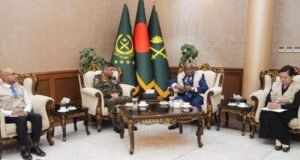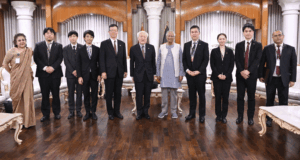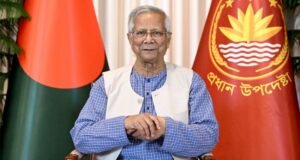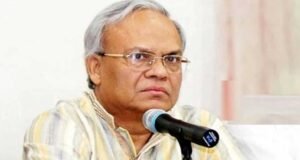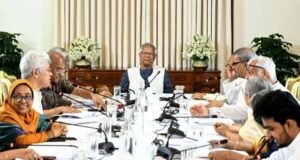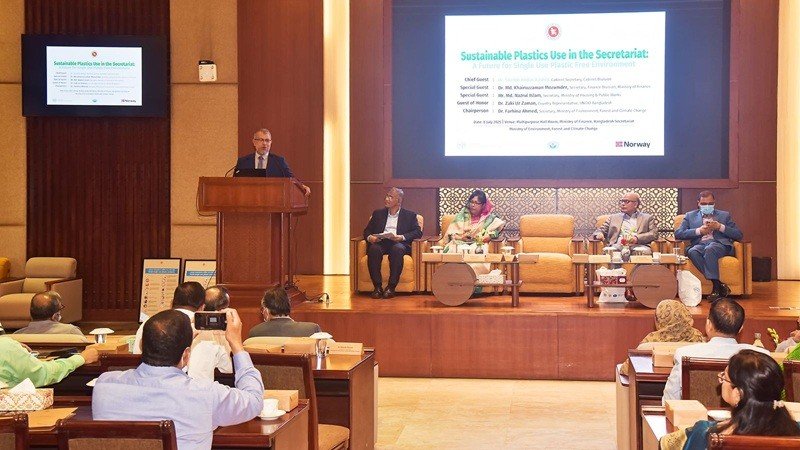
A seminar titled “Sustainable Plastic Use in the Secretariat: A Future for a Single-Use Plastic-Free Environment” was held today at the Multipurpose Hall of the Ministry of Finance at the Bangladesh Secretariat.
The event brought together high-level government officials and development partners to underscore the urgent need to eliminate single-use plastics (SUPs) from the Secretariat and its surrounding areas, paving the way for wider institutional change across government offices.
The seminar was organized under the project “Integrated Approach Towards Sustainable Plastics Use and Marine Litter Prevention in Bangladesh”, which is being implemented by the Department of Environment (DoE) under the Ministry of Environment, Forest and Climate Change (MoEFCC), with technical assistance from the United Nations Industrial Development Organization (UNIDO) and financial support from the Royal Norwegian Embassy in Dhaka. The project embraces a circular economy approach, embedding sustainable practices throughout the plastics value chain — from production and consumption to recovery and recycling — with the aim of reducing waste, enhancing resource efficiency and fostering clean technology innovation.
The event was presided over by Dr Farhina Ahmed, Secretary of the Ministry of Environment, Forest and Climate Change. Dr Sheikh Abdur Rashid, Cabinet Secretary, attended as Chief Guest. Dr Zaki Uz Zaman, UNIDO Country Representative in Bangladesh, joined as Guest of Honour. Special Guests included Md Nazrul Islam, Secretary of the Ministry of Housing and Public Works, and Dr Md Khairuzzaman Mozumder, Secretary of the Finance Division, Ministry of Finance. Dr Md Kamruzzaman, ndc, Director General of the Department of Environment, delivered the vote of thanks.
Delivering his remarks, Dr Sheikh Abdur Rashid, Cabinet Secretary, described plastic pollution as a “silent killer” and one of the most pressing environmental challenges of our time. Reflecting on human history, he referred to plastic as a “modern-day monster” created by our own consumption habits. “We are willing to spend thousands on luxury goods, yet hesitate to spend a mere 30 taka on a reusable jute bag,” he observed. He called for urgent behavioral change, civic awareness and stronger waste management systems, especially for medical waste which, he noted, poses even greater risks of contamination.
Dr Fahmida Khanom, Additional Secretary at the Ministry of Environment, delivered a keynote presentation titled “Hopes and Expectations”. She highlighted the alarming impact of plastic pollution on ecosystems, public health and the national economy. Referring to microplastics and nano-plastics infiltrating the food chain, she warned of their long-term consequences on human health and biodiversity. She reiterated the need to embrace the principles of reduce, reuse and recycle, and emphasized the importance of rigorous enforcement of environmental regulations coupled with mass awareness campaigns.
Dr Zaki Uz Zaman, in his address as Guest of Honour, reminded the audience that plastic pollution is not only a national crisis but also a global threat that endangers both human and animal life. He stressed the need for comprehensive strategies and bold action to transform waste into resources through innovative, circular approaches. He reaffirmed UNIDO’s ongoing commitment to supporting the Government of Bangladesh through sustainable industrial development initiatives and cleantech promotion.
Md Nazrul Islam, Secretary of the Ministry of Housing and Public Works, shared future plans to expand office space in the Secretariat area, including the proposed linkage of the GPO complex via underground corridors. He thanked all ministries and departments that have taken steps to keep their premises free of plastic waste.
Describing plastics pollution as a national concern, Dr Khairuzzaman Mozumder, Secretary of the Finance Division, reflected on the past transition from natural fibres to plastics, which were once celebrated for their convenience and affordability. He expressed concern that insufficient foresight about their environmental impact has now resulted in widespread pollution.
In his closing remarks, Dr Md Kamruzzaman, ndc, emphasized the symbolic significance of holding the seminar at the heart of national governance. He stated that actions taken at the Secretariat have the potential to inspire similar efforts across all levels of government administration.
A short video documentary on the scale and impact of plastic pollution was screened during the seminar, followed by an open discussion moderated by Dr Farhina Ahmed. Participants from various ministries and agencies actively contributed insights and recommendations.
The seminar is part of the project’s broader consumer awareness component, which has already engaged communities across Bangladesh through more than 30 cleanup events held at schools, madrasahs, universities, coastal villages, tourist areas and local markets. The Secretariat initiative builds on this momentum and aims to demonstrate leadership from within the highest administrative offices of the country.
 Weekly Bangla Mirror | Bangla Mirror, Bangladeshi news in UK, bangla mirror news
Weekly Bangla Mirror | Bangla Mirror, Bangladeshi news in UK, bangla mirror news



